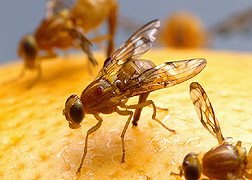This page has been archived and is being provided for reference purposes only. The page is no longer being updated, and therefore, links on the page may be invalid.
|
|
Post-Harvest Orchard Cleanup May Deter Mexican Fruit Flies
By Alfredo FloresJuly 12, 2002
Research shows that grapefruit growers can help reduce the danger of Mexican fruit fly infestation by removing all fruit remaining in trees and on the ground after harvest. Lacking this fruit, wild Mexican fruit flies will have to leave the area to find food and places to lay their eggs, and may die trying.
This finding comes from Agricultural Research Service entomologists David Robacker and Ivich Fraser at the Kika de la Garza Subtropical Agricultural Research Center in Weslaco, Texas. The Mexican fruit fly plays havoc with citrus crops in Texas, California, Florida, Mexico and Central America. Ten-year losses from the pest in South Texas and northern Mexico alone have been estimated at almost $7 billion from treatment costs, reduced crop yields, export sanctions and lost markets.
The damage occurs when fruit fly larvae feed on the grapefruit pulp, ruining the fruit for human consumption. But what perplexes scientists is that there’s new evidence that these flies do not naturally recognize grapefruit as a host. Robacker and Fraser have investigated the factors that attract the pest to an egg-laying site. Findings of how the fly perceives and reacts to its environment will help in developing better monitoring and control methods.
The researchers compared the responses of laboratory-raised and wild-strain fruit flies when exposed to grapefruit. Before testing lab-raised flies, Robacker placed grapefruit in cages with the flies for several days. Later, those females were 400 percent more attracted to the fruit than were flies without previous exposure.
This suggests that wild-strain Mexican fruit fly adults are likely to feed on whatever’s nearby when they emerge from the ground. So quick removal of fallen grapefruit might send the pest searching for other, less valuable alternatives.
ARS is the U.S. Department of Agriculture’s chief scientific research agency.

